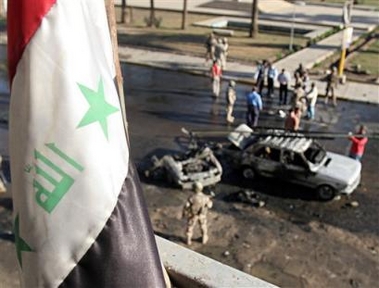|
Sunni ambush kills 14 Al-Sadr militiamen
(AP)
Updated: 2005-10-28 08:56
Sunni Arab militants killed 14 Shiite militiamen and a policeman Thursday in
a clash southeast of Baghdad — another sign of rising tensions among Iraq's
rival ethnic and religious communities. The U.S. military reported three more
American soldiers died in combat.
The Shiite-Sunni fighting occurred after police and militiamen loyal to
radical Shiite cleric Muqtada al-Sadr raided a house in Nahrawan, 15 miles
southeast of the capital, to free a militiaman taken hostage by Sunni militants,
according to Amer al-Husseini, an aide to al-Sadr.
After freeing the hostage and capturing two militants, the Shiite militiamen
were ambushed by the Sunnis on their way out of the religiously mixed town,
al-Husseini said. Police Lt. Thair Mahmoud said 14 others — 12 militiamen and
two policemen — were wounded.
The incident underscores tensions among hard-line elements in Iraq's rival
religious and ethnic communities at a time when the United States is struggling
to promote a political process seen as key to calming the insurgency so that
U.S. and other foreign troops can go home.
Both Shiites and Sunnis have accused one another of kidnappings and
assassinations, especially in religiously mixed Baghdad neighborhoods and
farming communities south and east of the capital. Majority Shiites and minority
Kurds generally support the Shiite-dominated government, while Sunni Arabs
dominate the ranks of the insurgents.
Sectarian violence has complicated efforts by the United States and its
coalition partners to promote a political process, which received a boost this
week with the announcement that voters had approved the new constitution in the
Oct. 15 referendum, despite strong opposition from the minority Sunni Arab
community.

An Iraqi flag flies over the scene of a bomb
attack, after a suicide car bomber rammed into an American military convoy
in Baghdad's commercial and residential district of Karada, Iraq,
Thursday, Oct. 27, 2005, killing one passer-by, injuring four others,
Iraqi police said. [AP] | Ratification paves the way for parliamentary elections Dec. 15. Some Sunni
groups have decided to field candidates in the election, signaling a desire to
participate in politics. Most Sunnis boycotted the last parliamentary election
in January.
U.S. officials hope Sunni Arab participation will draw away support for the
Sunni-led insurgency and allow Washington to draw down forces in Iraq before
midterm elections in November next year.
The U.S. command said two more Army soldiers were killed Wednesday when their
convoy hit a roadside bomb in Baghdad. Another U.S. soldier died Wednesday in an
ambush 37 miles north of Baghdad, the military said. Four other soldiers were
wounded.
The deaths raised the U.S. military death toll to at least 2,004 since the
start of the war in 2003, according to an Associated Press count.
U.S. Marines also killed three insurgents in fighting Thursday in Ramadi,
capital of volatile Anbar province, 70 miles west of Baghdad.
With attention now focused on the December elections, Iraqi political parties
are locked in intensive negotiations to put together lists of candidates, which
must be submitted to the election commission by Friday.
Three Sunni Arab groups have announced they will field a joint candidate
list, and the Shiite-dominated United Iraqi Alliance, which won 146 of the 275
seats in the January balloting, was meeting Thursday to try to put together a
ticket.
Shiite politicians said the last-minute talks were an effort to convince
Deputy Prime Minister Ahmad Chalabi, a former Pentagon insider, to joining the
Alliance ticket. Chalabi ran under the Alliance standard in January but is
apparently holding out for a promise of a greater role if the Shiites control
the next government.
"I think that Dr. Chalabi will be part of the United Iraqi Alliance," said
Shiite politician Abbas al-Bayati. "He is keen to be within the alliance and the
alliance is keen to include him."
A Chalabi aide, Haidar al-Moussawi, confirmed that talks were under way with
the alliance but said no agreement had been reached. Another Chalabi aide,
speaking on condition of anonymity because he is not authorized to speak for his
boss, said Chalabi's followers wanted the same number of places on the ticket as
bigger Shiite parties.
In addition, former Prime Minister Ayad Allawi is expected to announce his
ticket this weekend. Allawi, a secular Shiite, is trying to put together a
ticket of secular-minded candidates from all ethnic and religious communities in
a bid to appeal to voters tired of sectarian politics.
|